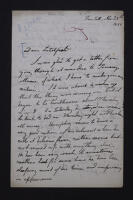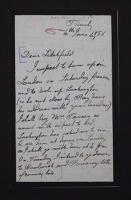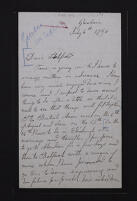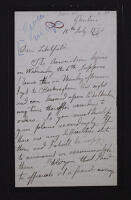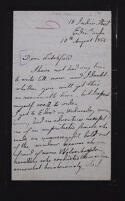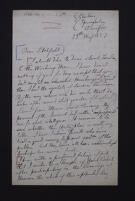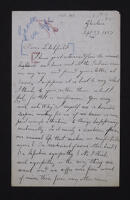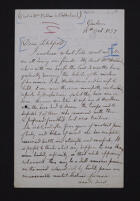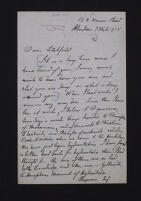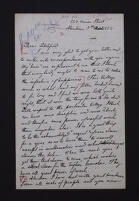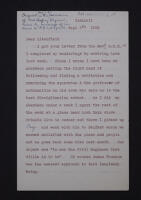Trin. Coll. Gives a report of Robert Henry Pomeroy’s illness; is busy with questionists regularly now, is about to get out some optical things to show them; has heard nothing from Cheltenham, Moderator [William Henry] Besant is recovering the use of one side of his face.
Litchfield, Richard Buckley (1832-1903) Barrister Clerk to Ecclesiastical CommissionersTrinity. Discusses plans to visit London; is looking through papers for some things not to be burnt, notes some are soft and good for packing; will take the Northwestern route to the north, notes that “the transition state from a man into a Don must come at last and it must be painful.”
Litchfield, Richard Buckley (1832-1903) Barrister Clerk to Ecclesiastical CommissionersGlenlair. Talks of plans and the amount of work to do at Glenlair, is fitting up a colour weaving machine fit for transportation, his top for doing dynamics; is studying the problem of Saturn’s Rings.
Litchfield, Richard Buckley (1832-1903) Barrister Clerk to Ecclesiastical CommissionersGlenlair. Discusses travel plans, invites him to visit, is looking for a tutor for a friend’s two boys.
Litchfield, Richard Buckley (1832-1903) Barrister Clerk to Ecclesiastical Commissioners18 India Street, Edinburgh. Describes his travels, including coming to the rescue of a woman afraid of some Wolverhampton revellers on the journey there, visits to family, mentions he was photographed four times at Peniciuk because of the light levels; J. F. MacLennan has been getting on with his “Law.”
Litchfield, Richard Buckley (1832-1903) Barrister Clerk to Ecclesiastical CommissionersGleinlair, Springholm, Dumfries. Describes a quiet life at Glenlair, and that he has not had a mathematical thought for a fortnight but is likely working subconsciously, shares news of friends and asks for more, notes how different his different his society is in Aberdeen.
Litchfield, Richard Buckley (1832-1903) Barrister Clerk to Ecclesiastical CommissionersGlenlair – Reacts to news of Robert Henry Pomeroy’s death in the Indian rebellion and reflects at length on memory and grief; a little girl in one of his men’s houses has died; is at home for a month with his aunt Mrs [Isabella] Wedderburn.
Litchfield, Richard Buckley (1832-1903) Barrister Clerk to Ecclesiastical CommissionersGlenlair. His aunt Mrs Wedderburn has learned of the murders of her cousin John Wedderburn and his wife and child in the Indian rebellion, and her son John and his wife in Moultan have had to disarm troops and dismiss others; is glad to have read the letter [Robert Henry Pomeroy’s last?]; reflects on Good and Evil; has almost finished with his work on Saturn’s Rings; illness continues in the house of the little girl who died.
Litchfield, Richard Buckley (1832-1903) Barrister Clerk to Ecclesiastical Commissioners129 Union Street, Aberdeen. Describes his work in Aberdeen, has found better textbooks by Galbraith & Haughton; has got up a model to show the motions of the rings of satellites; shares what he has been reading; comments on the Senior Wranglers and Smith’s prize men, has a student that he hopes will stay out of a small college “where boating billiards beer &c are more immediate paths to distinction that the pursuit of wisdom either mathematical, classical or social.”
Litchfield, Richard Buckley (1832-1903) Barrister Clerk to Ecclesiastical Commissioners129 Union Street, Aberdeen. Is pleased with the position at Aberdeen; reflects on his marriage [to Katherine Mary Dewar]; answers Litchfield’s questions with what he describes as a "metaphysical screed;" he gives his opinion on Catholics; a section apparently about marriage has been cut out; sends a paper set for his class and reflects on the quality of answers to the questions.
Litchfield, Richard Buckley (1832-1903) Barrister Clerk to Ecclesiastical CommissionersGlenlair. Has been at Aberdeen, is now on holiday with friends, invites Litchfield, mentions friends Robert Henry Pomeroy and Wilfred Lucas Heeley, discusses different ways of summing up the personalities of friends.
Litchfield, Richard Buckley (1832-1903) Barrister Clerk to Ecclesiastical CommissionersFour letters: "Refers to I. Newton letter to Sam. Pepys 23 Dec. 1693 bought by R. J. Edleston from F. Barker (who bought it from [?] 'Bibliotheca Phillippica' 4th July -6 July 1892) and later presented by Miss Edleston to Trinity College Library in 1953." - note on second page of Add.Ms.c.1/100.
Edleston, Joseph (1816-1895) Fellow and Bursar of Trinity College CambridgeIncludes notes on Heinrich Ritter's History of Ancient Philosophy, George Grote's History of Greece, a draft of a paper given on "The Accentuation of Ancient Greek" dated Nov. 12, 1860, as well as a translation of Act I of Goethe's "Götz von Berlichingen".
Clark, William George (1821-1878), literary and classical scholarInforms her that they have posts there [in Keswick] occasionally, if she wishes to write. Writes a list of 'pros and cons' in relation to their accommodation. Concludes that on the whole 'it is the best situation in Borrowdale: and therefore in the English Lakes: and therefore, for short mountain walks, in the World'. Admits to not liking the scenery as much as he did three years previously, and thinks that neither does William, but concedes that the scenery is beautiful.
Reports that they have met Edmund Fisher and his wife, 'who is nice and prettyish'. Announces that he reviewed a poem called Ludibria Lunae in the Spectator. It is a satire on the efforts to emancipate women from their subjection, and he claims to have tried to be as stinging as he could, without showing that he had lost his temper. Announces that they expect [G. O.] Trevelyan soon, and that he is to be married on 24 September. Reports that William 'does not seem unwell particularly', but his sleeping has not improved as much as they had hoped. Sends his love to Edward and the children. Asks if she heard that F[rederic] Fisher was engaged to his Bishop's daughter [Agnes, daughter of the Bishop of London, John Jackson].
Announces that he is going to Cambridge 'on the 3rd', and is thinking of going to visit her for a night or two 'after the 11th and before the 18th if convenient.' Remarks that the Rugby news was a shock, and states that he ceases to advise acquiescence [a reference to the troubles with the head, Henry Hayman?]. Reports that Arthur was skating on the Downs.
Reports that Mr [G. G.?] Bradley told him that he forwarded Henry's watch to him at Wellington College, and suggests that she [Minnie] has pawned it. Asks her to send it to him at Trinity College, where is going on the following Saturday, if it is 'hanging about [Wellington] College anywhere'. States that he arrived at Rugby by Calais. Claims to like the house at Rugby very much. States that the dining-room can only hold twelve people, but that the drawing room 'is very nice.' Reports that there are 'an extraordinary number of new masters' there, with the result that 'the time-honoured arrangements are undergoing much criticism.' Hopes that Ada [Benson] got safely to Weston that day 'without having another attack.' Does not think that their mother looked very well. Claims that Mr Ladkin 'behaved like a Beast.' Reports that they have just been consulting Mr [Charles?] Waterfield as to the advisability of going to [Law] with him. States that he bought a print of his favourite Correggio 'with the jolly little cherub astride the cloud.' Asks whether Edward has filled up the vacancies satisfactorily, and sends his love to him.
Refers to [W.F.] Barrett's letter as 'a bore'. States that they must 'maintain the distinction between experimental work and collection of narratives, and between hypnotic and normal state'. Suggests that they appease Barrett by admitting 'the great advantage of having all the evidence set forth together from time to time by an able hand' and allow him to print his paper, provided it is not called a 'Report of the [ ] [ ] Committee.' States that he is writing to Gurney with this proposal. Adds that he intends to propose the Lord Rayleigh F.R.S. as Vice-President [of the Society for Psychical Research] at their next council meeting.
States that what Myers has told him 'is certainly a relief', and claims that he shall now find it easier to tell those who have to be told, 'without saying anything about his insanity.' Refers to a séance, at which he, Nora, [Henry] Slade and Lankester were present, and which is the subject of some controversy. Thinks that Myers had better go, 'when Miss B[ibby]'s sittings are over, if nothing else turns up.' States that if Myers comes across anything good, he [Henry] will instantly come to town and go with him. Undertakes to send back Miss B[ibby]'s note the following day. Sends his regards to Myers' mother.
States that he and Nora are 'intensely interested' by Myers' letter. Claims that, taken in connection with their experience, 'the evidence for "spiritual [thoughtreading]" at least is strong in proportion to the improbability of unconscious self' on the part of both Nora and Myers. Does not think the evidence of identity strong, 'unless the statement about the M.S. turns out correct.' Claims that the long message seems 'vague; and the mention of Edward [ ] not very strong.' States that he has found it very difficult to think of questions to which Myers will not know the answers, but has put down some.
Thanks him for sending him 'J'ai perdu..' [a translation of Alfred de Musset's poem Tristesse, which begins with these words], but claims that he is not altogether contented with it. Analyses parts of the poem in terms of its translation, and remarks, for example, that the second four lines do not seem to him 'to give Alfred's feeling.' Questions him in relation to 'the Translation of Faith [a poem by Myers] ', which he finds 'more than impressive.' Refers to 'the enclosed' [not included], which will show Myers how they have got on so far.
Claims to find Myers' verses 'very moving'. Goes on to list his objections in relation to its content. With regard to Sir B[ ], thinks it would be undignified to make an obvious effort to [ ] him, 'unless through some one who knows him personally.'
Asks whether the 'I. of the S.' is proved or not. Wishes Myers to dine with him 'on Thursday at 7.15', and reports that his Anglo-Indian friends, the [Charles?] Bernards will be there, and he wishes them to hear Myers' 'additional evidence'.
